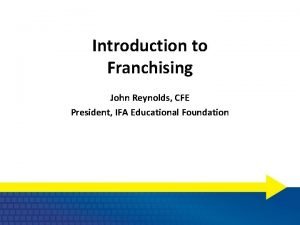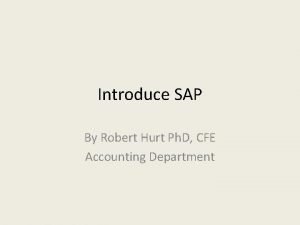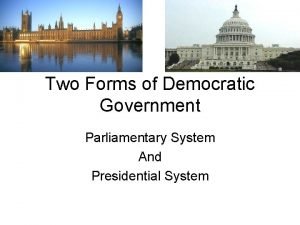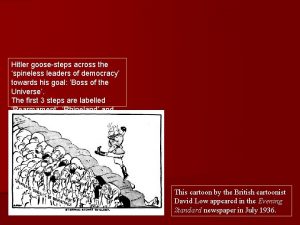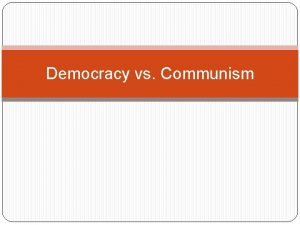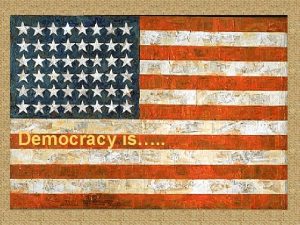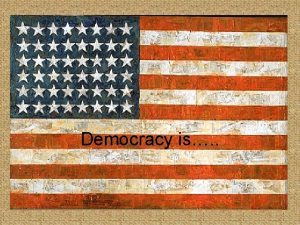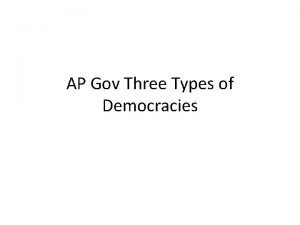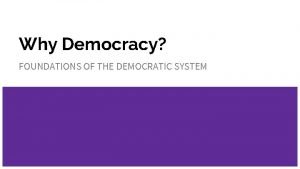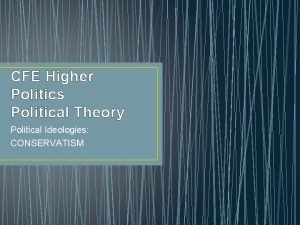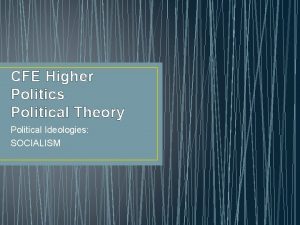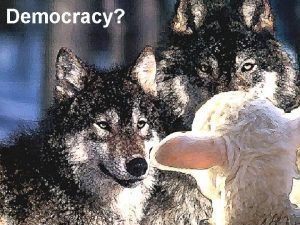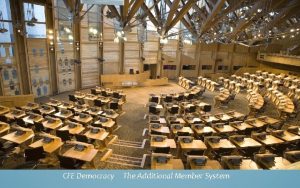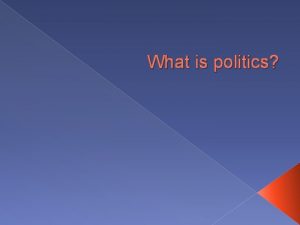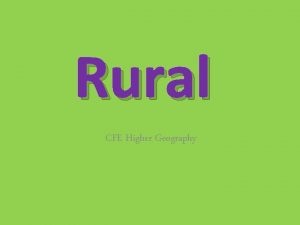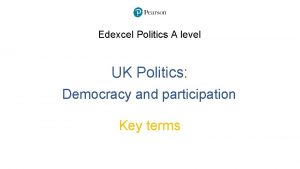CFE Higher Politics Political Theory Democracy Democracy The































- Slides: 31

CFE Higher Politics Political Theory Democracy

Democracy • The word ‘DEMOCRACY’ comes from the Greek words ‘DEMOS’ and ‘KRATOS’ meaning ‘common people’ and ‘rule’ • ‘democracy’ therefore literally means government/rule by the people • ATHENS, a Greek City State practised a form of DIRECT DEMOCRACY from the 5 th century BC It is known as the ‘cradle of democracy’ – however democracy may have existed before! • ‘democratic’ – is used to describe any situation in which people have a say in the way affairs are conducted • Democracy can also be defined in terms of accountability

Democracy - Accountability can be divided into 2 types: 1 – Those who exercise power do so either as elected representatives or appointed officials. They conduct their activities with the knowledge that they are accountable to a legislature and judiciary and/or the people 2 – Powers and Responsibilities are delegated by those in positions of power to people who are charged with carrying out the will of the people in power e. g. Govt minister delegating policy decisions to the civil service The idea of Democratic Accountability is one in which power is invested in the many and not the few

Democratic Accountability The different forms of Democratic accountability can be drawn from Abraham Lincoln, when he was President of the USA, He stated Democracy was/is ‘government, of the people, by the people, for the people’ – (Abraham Lincoln 1863)

DIRECT DEMOCRACY • Direct Democracy is based on ‘direct’, unmediated and continuous PARTICIPATION of citizens in the tasks of government • Direct Democracy therefore REMOVES the distinction between the ‘government and the ‘governed’

DIRECT DEMOCRACY • Direct Democracy is a system of Popular selfgovernment • It was achieved in ancient Athens through a form of government by mass meeting • The most common MODERN form of direct democracy would be the use of REFERENDUMS • Examples of Referendums • Since 1973 there have been 11 referendums • 2014 Independence • 2016 EU • List of all referendums

Direct Democracy – Move with your feet! • • • Cannabis should be legalised Capital punishment should be brought back The police in the UK should be armed Trident should be scrapped Assisted suicide should be legalised A tax should be placed on fatty foods to combat obesity • Prisoners should be allowed the vote • The named person bill should be passed • Income tax should be cut from the current basic rate of 20% to 17. 5%

The benefits/advantages of DIRECT DEMOCRACY • • Direct Democracy heightens control = ‘pure form of democracy’ i. e. making decisions for yourself. • It is argued that Direct Democracy creates better- • informed and more politically literate citizens i. e. need to be informed to make decisions. The 2014 Referendum brought with it lots of participation. Live Leaders Debates, Political Rallies and political debate of Social Media Direct Democracy enables the public to express their own view without having to rely on SELF-SERVING politicians. Direct Democracy ensures legitimacy – people are more likely to accept decisions that they have made themselves.

Drawbacks of Direct Democracy • There always restrictions on who can vote Athens in about 500 BC, when all free men were entitled to attend forums to approve policies. Women, children, slaves or those born outside Athens were excluded: citizens were only Athens-born men. Restrictions on voting continued in Western countries until the 20 th century – all women were unable to vote in the UK until 1928. In the USA, many blacks in the Southern states were unable to vote until the 1960 s: Swiss women did not get the vote until 1971. Age restrictions remain in many countries, with children excluded from political participation (in the UK until the age of 18). Scottish 16 and 17 year olds were permitted to vote in the 2014 referendum but excluded from the 2016 EU referendum The minimum voting age ranges from 15 in Iran to 21 in many others.

Democracy Voting ages around the world 15 16 17 18 19 20 21 25

Plato’s criticism of Direct Democracy • Plato (427 -347) Political Theorist • Described by some as the greatest ever Western philosopher • He argued that direct democracy does not work because “the masses” (most people) do not have the expertise to make certain decisions • Ordinary people are easily influenced

• Socrates and Plato, argued that the majority of the people, because they were by and large ignorant and unskilled, would always get it wrong. • In these intellectuals' view, government was an art, craft or skill, and should be entrusted only to the skilled and intelligent, who were by definition a minority. • They denied specifically that the sort of knowledge available to and used by ordinary people, popular knowledge if you like, was really knowledge at all. • At best it was mere opinion, and almost always it was ill-informed and wrong opinion.

US Example – Proposition 8 California • Propositions in the USA is like a referendum in the UK • It has been alleged that the Mormon Church influenced the outcome of the Proposition 8 vote in California in 2008 on gay marriage by spending large amounts of money to influence voters. • Proposition 8 Eliminates Rights of Same-Sex Couples to Marry. • Yes 52. 24% • No 47. 76% • This has been since ruled unconstitutional and has been reversed (2013)

Present Day – The Media can influence public opinion • Example 2016 – Result of the EU referendum • Majority not informed about the economics • Relied heavily on the media • Who controls the media? • The result – majority Brexit • Immigration claimed to be the main reason why many voted to leave

Limitation of Direct Democracy • The cost of referendums and the time it takes is unnecessary

REPRESENTATIVE DEMOCRACY • Representative Democracy is an indirect form of democracy. • Participation is limited in that it is generally infrequent and brief i. e. voting every 4 -5 years. • The public DO NOT exercise power themselves, they select (elect) those who will rule on THEIR BEHALF

REPRESENTATIVE DEMOCRACY • This is DEMOCRATIC as REPRESENTATION establishes a RELIABLE and EFFECTIVE link between the government and the governed. • This is expressed through the notion of an ‘electoral mandate’

Benefits/Advantages of REPRESENTATIVE DEMOCRACY • Representative Democracy offers a PRACTICABLE form of democracy (direct popular participation is achievable only in small communities) • Representative Democracy relieves ordinary citizens of the burden of DECISIONMAKING – a division of labour is created in • Representative Democracy allows government to be in the hands of those with EXPERT knowledge, EXPERIENCE and perhaps better EDUCATED. • Representative Democracy maintains STABILITY – as it distances ordinary citizens from politics and encourages COMPROMISE • ACCOUNTABILITY is an important feature in Representative Democracy – • Examples of how politicians are held to account. . .

Joseph Schumpeter – Political Theorist • Schumpeter considered representative democracy a credible solution to the problem of most people simply not having sufficient time or expertise to be able to continuously engage in complex political debate. • This system enabled individuals to select from a variety of politicians/parties, each offering different policy options. • In this way political elites present themselves to the electorate on a regular basis and remain accountable to the electorate for the decisions they make. • The PM is held to account every Wednesday through PMQT

Criticisms of Representative Democracy • The voting system does not always ensure true representation • FPTP - % of votes does not = % of seats. How legitimate does this make the government? • 2015 Conservatives won with only 36% of the vote – 50. 9% of the seats • UKIP – 12% of vote and 1. 2% of seats

Restrictions on who can vote • Age – UK elections voting age is 18 years • Prisoners cannot vote – is this truly democratic and representative?

Are democracies always representative the people? • Female population in the UK – 50% • Female MPs 29% • Ethnic minority population in the UK – 14% • Ethnic minority MPs – 6%

Limited opportunity to vote for representatives • MPs are only elected every 5 years • If they are in a safe seat these representatives can go a long time being voted out Marion Fellows won in 2015 with a 12, 000 majority Neil Gray won by over 8000 votes

What if a Leader of a party retires? • How legitimate is Theresa May as a leader? She did not win a General Election • Is now leading the country

A Similar situation occurred in 2007 • Tony Blair retired and Gordon Brown became the leader of the Labour party and the Prime Minister without winning a general election

Unelected Decision Makers • Many people question the legitimacy of the House of Lords • Lords are appointed • The have expertise but are not accountable to voters through elections

Make up of the House of Lords • 26 bishops • 91 Hereditary peers • 693 Life peers


USA • Considered to be the • Link to campaign most democratic spending country in the world • Supreme court judges are appointed by the president – are involved in the passing of Laws • Whoever spends the most in the campaign usually wins the election

The benefits of direct democracy are far superior to those for representative democracy. • Discuss with reference to the ideas of relevant theorists. • 20 marks • Due 10 h October • Important things to discuss • Key features of direct democracy (eg citizens participate fully in the political process, creates a better informed citizenry, don’t have to rely on self-serving politicians, heightens the control of citizens). • Key features of representative democracy (eg voters choose representatives to make decisions on their behalf, more practical than direct democracy, allows government to be in the hands of those with expert knowledge, ordinary citizens don’t have to be directly involved). • Ideas of relevant theorists associated with each approach (eg Plato’s critique of direct democracy, Schumpeter’s evaluation of

• Direct democracy means that individuals make the decisions and are expected to participate fully in the political process. Direct Democracy was used in Ancient Greece where every free man was permitted to vote on laws. More recently Direct Democracy can be seen in the use of referendums in the UK. Most recently the vote held in June 2016 on the UK’s future in the EU. Sometimes called ‘pure’ democracy, this system negates the need for legitimacy as citizens legislate for themselves. The public will generally accept decisions as the majority have voted for them. This system heightens the control held by citizens and creates a better informed and more politically knowledgeable citizenry. People are then able to express views and interests without the need of self-serving politicians. Some political theorists such as Steven Lukes have claimed that ordinary people can be manipulated by politicians and those in power who make decisions claiming it is in the publics best interest (third face of power). Politicians can set their own agenda and the public rarely get a say. With Direct Democracy this puts all the power into the hands of the public. However, even in situations where direct democracy is used there are restrictions on who can vote meaning that it never fully represents the whole population. Even in Ancient Greece women and slaves were excluded meaning the democracy was not completely pure. In present day referendums which are a form of direct democracy the age limit restricts the involvement of the whole population. In 2014 sixteen and seventeen year olds where permitted to vote in the Scottish Independence Referendum but this same age group were excluded from the 2016 EU referendum. Therefore while direct democracy does have the benefit of fully involving the public in decision making, in reality it does not represent the whole population due to restrictions on who can
 Higher chemistry unit 3 notes
Higher chemistry unit 3 notes Cfe 4 capacities
Cfe 4 capacities Ifa cfe
Ifa cfe Cfe
Cfe Sap cfe
Sap cfe Different between parliamentary and presidential
Different between parliamentary and presidential David low spineless leaders of democracy
David low spineless leaders of democracy Democracy vs communism political cartoon
Democracy vs communism political cartoon Make a cartoon analysis about democracy
Make a cartoon analysis about democracy Direct democracy cartoons
Direct democracy cartoons Participatory definition ap gov
Participatory definition ap gov Poster about political democracy
Poster about political democracy Power and politics organization theory
Power and politics organization theory Comparative theories politics a level
Comparative theories politics a level Hát kết hợp bộ gõ cơ thể
Hát kết hợp bộ gõ cơ thể Bổ thể
Bổ thể Tỉ lệ cơ thể trẻ em
Tỉ lệ cơ thể trẻ em Chó sói
Chó sói Chụp tư thế worms-breton
Chụp tư thế worms-breton Alleluia hat len nguoi oi
Alleluia hat len nguoi oi Các môn thể thao bắt đầu bằng tiếng nhảy
Các môn thể thao bắt đầu bằng tiếng nhảy Thế nào là hệ số cao nhất
Thế nào là hệ số cao nhất Các châu lục và đại dương trên thế giới
Các châu lục và đại dương trên thế giới Công của trọng lực
Công của trọng lực Trời xanh đây là của chúng ta thể thơ
Trời xanh đây là của chúng ta thể thơ Mật thư tọa độ 5x5
Mật thư tọa độ 5x5 Làm thế nào để 102-1=99
Làm thế nào để 102-1=99 Phản ứng thế ankan
Phản ứng thế ankan Các châu lục và đại dương trên thế giới
Các châu lục và đại dương trên thế giới Thể thơ truyền thống
Thể thơ truyền thống Quá trình desamine hóa có thể tạo ra
Quá trình desamine hóa có thể tạo ra


